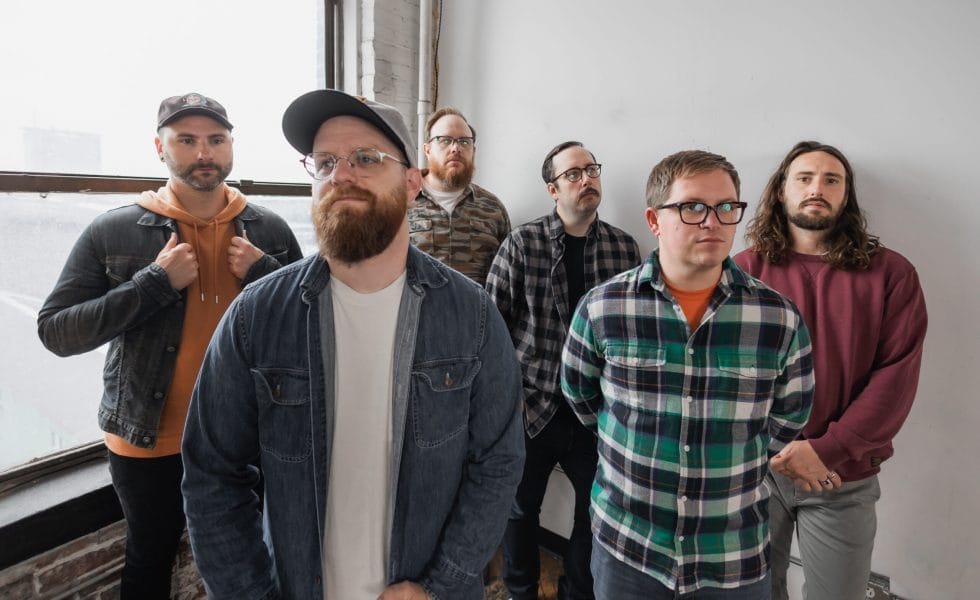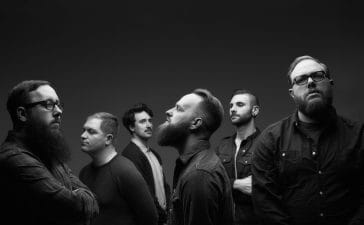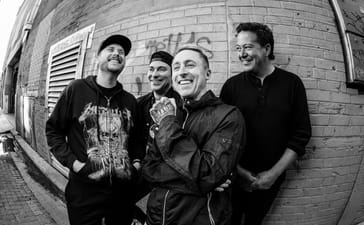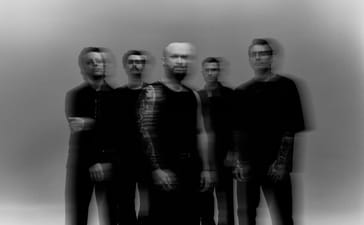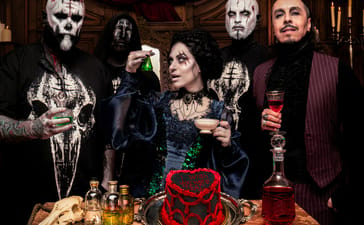Fans of pop punk’s best and brightest The Wonder Years have been with frontman Dan Campbell through a lot. Over a decade ago on The Upsides, we commiserated with him over his college experience. A few years later on The Greatest Generation, he questioned whether or not he had fucked up when he saw everyone else from his graduating class having kids and getting married. On his latest album, The Hum Goes On Forever, Campbell enters into a new chapter of his life, from grappling with the grief that comes with growing up and losing loved ones along the way as well as his journey into fatherhood. We caught up with Campbell in commemoration of the seventh studio album from The Wonder Years being out now.
On the new record, you have a track titled ‘Songs About Death’, and it made me think about the Nietzsche quote, “if you gaze long into an abyss, the abyss also gazes into you.” How does it affect you to refocus on grief, writing these songs and then revisiting them on stage when you play them?
It’s night to night. So like a lot of times, you can almost build up a callous to it, or a dissonance where the repetition of it…You say a word enough times and it stops having meaning. There’s a name for that. Ted Lasso taught me. It doesn’t matter. What I mean to say is that there are nights where I can play those songs, and it does not affect me. I can just play them, and perform them, because like…that is my job. And then there are nights where I ruminate on the lyrics or something happens to me during the day that has me thinking too much about it, and you kind of open that wound back up again. The really difficult thing was you know, post-pandemic, we were having a rehearsal and we were playing ‘Raining In Kyoto’ and I was falling into pieces at a rehearsal singing it, because the callous was gone. It’s raw again. It’s like playing guitar, when I play guitar in my other band, and I don’t do that band all the time, right? The Wonder Years is the priority, Aaron West is the side gig, so I don’t always play a lot of guitar. And then we go on an Aaron West tour, and I’m like, “Fuck, my fingers hurt.” They’re raw again because the callous is gone because I hadn’t played in so long. It felt like that, but inside my brain. I have a tendency to pick at wounds and a tendency to write songs that allow me to do that to myself.
Are there other ways that you process grief? Or is it purely through making music?
I think music is really my primary way of doing it. And I’ve said this in so many interviews now, so I’m sorry to just give you the same quote, but it kind of dawned on me on this record cycle – what I’m actually doing is I’m taking grief or sadness or trauma that I have and I’m deconstructing it to its component pieces. And then I’m using those pieces to build something that is useful for others to deal with that problem. So I’m taking this sadness, and I’m re-fashioning it into something that you can use to make yourself feel better, or understood, or seen. That’s truly an unbelievable gift to be able to do that for other people. And that alone is why I do it, right? I took something terrible and I made it something useful. That feels good.
You’ve said that prior to starting on this record, you sat down and thought about who The Wonder Years were, what you guys do. Is that the answer to that question?
That’s definitely a lot of the answer. We make things that people can commiserate with. We make things that are useful. And I think a lot of it was also thinking about like, we exist in physical spaces, I think a lot of it is for us. We might be a little old school in the sense of like, we don’t fuck with the internet that much, ‘cause we don’t really like doing it. I care more about the presentation of our record on vinyl, I want to be at a show exchanging energy with a crowd, more than I want to be on socials. I want to hold our record and feel the physical weight of the work that we put in, more than I want to see it on a streaming platform. That’s not to say that I don’t care about those things at all. I understand the value of them, and I don’t mean to say it in a way that means I feel one is better than the other. I feel one is more authentic to us.
Obviously, the scene has changed since The Wonder Years started out, but you’re also in a different place in life – where you previously sang about seeing your friends get married and have kids, now you’re partnered with your own. Does it feel like you got what you wanted? Or is it just a different scenario and you’re just dealing with different subjects to be anxious about?
I think that it’s probably more the latter. I think the idea that any single thing, whether it’s a goal you have, whether it’s like, “I want to have kids and a partner” or “I want to hike a fucking mountain,” whatever your thing is. Getting there isn’t a panacea for your life. It’s not like, “I did the thing, great. Mission accomplished. I feel good all the time now.” Especially when you are someone who has constant battles with their own brain chemistry. That’s kind of the point of the record, right? The Hum Goes On Forever is to say that it will be louder and it will be quieter at different points. It will never be gone. You’ll always have it, you’re always going to live with it. It’s just a matter of finding ways to function and enjoy the little things when it is quiet.
The album title was taken from a poem in the Sister Cities booklet, right? You released a poetry book, Paper Boats or Some Poems I Wrote, a while ago – is a second book on the cards?
The problem with writing poetry is that most of the things that I write that could be fashioned into poetry end up as lyrics, because like, that is my job, and I have to like…do it. I have this idea of releasing a book of poetry where each poem is based on one entry into my dream journal. And so they would be kind of bizarre poems, but every time I have a notable dream that I remember, I try to write it down as soon as I remember it. Sometimes I’ll fall back to sleep and wake up and be like, “What the fuck does this say?” I thought it would be an interesting experiment. I am working on a graphic novel though, that’s the most literary that I am at the moment.


